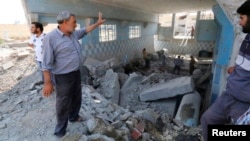The impressive results of U.S. air strikes in Iraq this month are prompting new calls from some quarters for similar U.S. intervention in Syria.
Abdulrahman Dadam, president of the Free Aleppo Governorate Council, wrote an impassioned plea for a U.S./NATO no fly zone to protect his historic city from both the Islamic State (IS) and the regime of Bashar al-Assad and establish a safe corridor from Turkey for humanitarian aid.
“The fall of Aleppo would precipitate a series of catastrophic events in Syria, further tipping the scales in favor of Assad’s forces and the expansion of ISIS,” Dadam warned. “Without air support and weapons from the United States, we stand little chance to prevent this collapse and sustain our city as a beacon for Syrians engaged in the two-front conflict against both terrorists and the regime.”
For someone who advocated such a no fly zone in Syria three years ago – before the rise of IS – Dadam’s arguments have merit. But for now, it seems unlikely that the Obama administration will open a second front against IS without a broader regional and international consensus about what the future of Syria should be.
The peaceful removal of Nouri al-Maliki as prime minister of Iraq created an important precedent. Maliki – whose State of Law party actually won a reasonably fair election in April – agreed not to seek a third term under pressure from both the United States and Iran as well as the senior Shi'ite Muslim cleric in Iraq, Ayatollah Ali Sistani. Other important countries that have been hostile to the Maliki government, such as Turkey and Saudi Arabia, also signaled their approval for the designation of a new prime minister, Haider al-Abadi.
Unfortunately, such a broad consensus is lacking when it comes to Assad, who recently “won” a third seven-year term in an election that offered no viable competition.
Russia and Iran continue to support him and Assad has cleverly used the menace of IS to argue that even his bloody regime is superior to a group so extreme that it has been excommunicated by al-Qaida central. He was, of course, complicit in the rise of this Frankenstein’s monster – opening the prisons and releasing Islamic extremists in an effort to discredit more moderate opposition forces. He also bought time by dribbling out his known stocks of chemical weapons, all of which have now been destroyed.
Just because Assad sees himself as irreplaceable does not mean he is or need be much longer. The U.S. should build on the diplomacy it used to pass a UN Security Council Resolution last week against IS to revive consultations on a post-Assad future for Syria that can bring together elements of the regime with the moderate Syrian opposition. Squeezed between Assad and IS, the moderates currently have no chance of success – even with much greater U.S. military support.
Key players in this new diplomatic effort include the U.S., Turkey, Saudi Arabia, Russia and Iran. The latest UN special envoy for Syria, Staffan de Mistura, should be in charge of the process. Unlike the failed “Geneva II” talks – from which Iran was excluded at the last minute – Tehran must be an integral party from the start.
Iranian officials have indicated that they have no love for Assad but have backed him in the absence of a credible alternative. However, the rise of IS – which is now on the border with Iran in Iraq’s Diyala province – has altered Iranian priorities and put the U.S. and Iran together in a tacit alliance against the Sunni extremists in Iraq.
If elements of the Syrian regime and opposition can coalesce on an anti-IS platform, that could change the calculations in both Tehran and Washington. It is certainly a topic worth discussing on the sidelines of upcoming nuclear negotiations.
The U.S. strategy against IS in Iraq is only succeeding because the Iraqi government and the Kurdish Peshmerga are cooperating and providing the necessary ground forces.
Interrupting his Martha’s Vineyard vacation earlier this week to mark the recapture of the strategic Mosul dam from IS, President Obama noted, “this operation demonstrates that Iraqi and Kurdish forces are capable of working together in taking the fight to ISIL. If they continue to do so, they will have the strong support of the United States of America.”
U.S. policy in Syria should shift from half-hearted opposition to both IS and Assad to building a coalition against IS that a majority of Syrians can support. This will be a major diplomatic project that might also entail more U.S. military involvement which could be easily justified by humanitarian aims, such as protecting a humanitarian corridor to Aleppo.
Without a broader strategy, however, Congress is likely to balk – as was evident a year ago when Congress refused to approve U.S. air strikes on Syria's chemical weapons.
With nearly 200,000 dead, a third of the population displaced and much of Syria destroyed, it is imperative that the U.S. and the rest of the international community revive their efforts to find a political solution that will remove Assad and unite a majority of Syrians against IS. Every day that the Syrian war continues, it creates more potential recruits for IS in Syria and in neighboring states overflowing with Syrian refugees.
Although Obama hasn't mentioned Syria much lately. it is not sufficient just to fight IS in Iraq. This cancer must be attacked from both sides if it is to be defeated.





